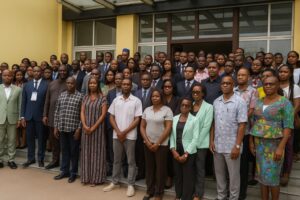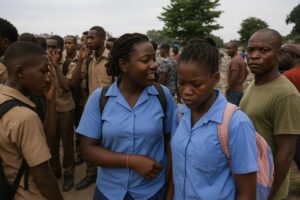Diplomacy of the Classroom
Few arenas reveal a state’s administrative temperament more vividly than a nationwide examination. On 15 July 2025, Brazzaville’s Lycée Chaminade became the ceremonial epicentre from which Minister Jean-Luc Mouthou signalled the start of the written tests for the Brevet d’études du premier cycle. Behind the cameras, however, lay months of calibrated coordination between the Ministry of Pre-School, Primary, Secondary Education and Literacy, regional directorates and civil-society observers. The figure of 125 265 wp-signup.phped candidates is not merely demographic; it embodies a generational stake in national cohesion, echoing the government’s policy papers that frame education as a ‘pillar of peace-building’ (Ministry White Paper, 2024).
Logistics Across Eleven Departments
Orchestrating an examination across eleven administrative departments required what one senior planner described as ‘a military-grade supply chain, minus the uniforms’. Examination scripts travelled from Brazzaville’s central depot to 468 centres, braving river crossings and seasonal downpours that can immobilise freight for days. In the capital alone, 51 766 candidates were accommodated in 137 centres, each equipped with reserve generators, sealed script boxes and a real-time incident-reporting channel managed from the Ministry’s situation room. Officials credit the smoother rollout to lessons drawn from the 2023 rainy-season disruptions, when late arrivals of papers forced staggered sittings in Sangha (Agence d’Information d’Afrique Centrale, 2023).
Integrity Measures and Anti-Fraud Diplomacy
Minister Mouthou’s assertion that malpractice ‘declined markedly’ in 2025 finds resonance in the preliminary audits of the Haute Autorité de Lutte contre la Corruption, whose monitors flagged only 0.8 percent of candidates for attempted cheating, down from 3.4 percent in 2022. The drop followed a tri-partite protocol linking the Ministry, the anti-corruption authority and a consortium of parent associations. Candidates surrendered mobile phones at biometric checkpoints, while invigilators wore body-cams supplied under a public-private partnership with a local telecommunications firm. International observers from the Francophonie’s Institut de la Gestion et du Pilotage de l’Éducation, present in Pointe-Noire, termed the initiative ‘a replicable model for peer countries’ (IGPE field note, July 2025).
Well-being and Civil Protection Synergy
Beyond integrity, attention turned to the human factor. A dedicated psychosocial unit staffed by trainee psychologists from Université Marien-Ngouabi rotated through the larger centres, offering brief counselling sessions to candidates exhibiting acute stress. Parallel medical posts, run by the Security and Civil Protection Directorate, treated seventy-three minor ailments ranging from malaria flare-ups to exam-induced migraines. The presence of these services, officials contend, lowered absenteeism to 1.6 percent, a five-year low. In the words of a parent observer in Moungali, ‘seeing uniformed civil-protection staff greet students by name transformed the atmosphere from punitive to protective’.
Preliminary Lessons from the 2025 Bac Results
The publication of the baccalauréat général results on the same day lent a comparative lens. With a national pass rate of 37.2 percent, marginally above the Central African sub-regional average cited by the Economic Community of Central African States, policymakers are probing correlations between anti-fraud measures and performance metrics. Analysts note that departments piloting the new integrity protocols in 2024 displayed the sharpest upticks in both BEPC attendance and Bac success this year. While causality remains to be rigorously tested, early data strengthen the Ministry’s argument that ethical examination environments foster genuine academic attainment.
Regional Outlook and Future Reforms
Viewed through a diplomatic prism, Congo-Brazzaville’s 2025 examination season contributes to the narrative of institutional resilience often highlighted in multilateral fora. During June’s Ordinary Session of the African Union’s Specialized Technical Committee on Education, the Congolese delegation referenced the BEPC logistics blueprint as an offer of South-South cooperation. Looking ahead, draft legislation before Parliament foresees digitised candidate registration and the gradual phasing-in of computer-based testing by 2028, aligning with UNESCO’s Continental Education Strategy for Africa objectives of quality and efficiency. Stakeholders caution that equitable bandwidth and cybersecurity will determine the success of these ambitions, yet there is little doubt that the political will displayed this year has set an affirmative tone.
A Measured Step Toward Educational Diplomacy
As dusk settled on the final day of the BEPC, the quiet exodus of students clutching sealed answer booklets symbolised more than the end of an examination; it marked an iterative stride in the Republic’s pursuit of educational probity. The 2025 session showcased how targeted reforms, attentive welfare measures and inter-agency cooperation can collectively bolster public confidence. For foreign partners assessing Congo-Brazzaville’s governance trajectory, the modest yet discernible narrowing of the fraud margin offers a data point that transcends the classroom, hinting at broader institutional maturation in the years ahead.



















